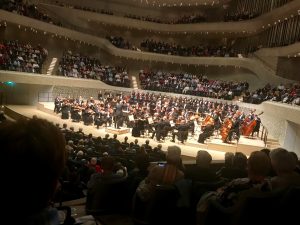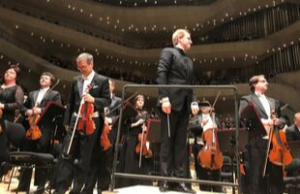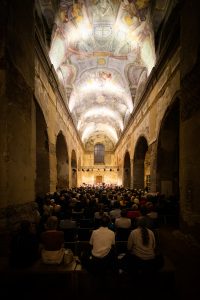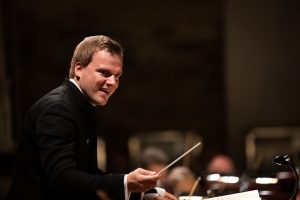Janáček Philharmonic Orchestra performed Beethoven’s 9th Symphony at „Elphi“
On September 22, JFO took advantage of an opportunity to perform at a recently opened concert hall, in short, called Elphi, of Elbphilharmone in Hamburg.
 Have traveled all over the world, JFO performed e.g. in the USA, Asia, and many European cities. As a new concert hall in Ostrava is being projected, in the previous season JFO carried out many concerts in halls opened in the last decades. Such visits are planned for the current season as well.
Have traveled all over the world, JFO performed e.g. in the USA, Asia, and many European cities. As a new concert hall in Ostrava is being projected, in the previous season JFO carried out many concerts in halls opened in the last decades. Such visits are planned for the current season as well.
Elphi has opened two years ago, and since then, it has been luring tourists. The building is situated in HafenCity, which is a modern quarter of Hamburg, on a bank, where a harbor used to be. The curiosity of the Elphi building is its roof, which is to imitate a stormy sea. The concert hall has a capacity of 2100 seats in a vineyard-like room. The perk of this deployment is that no one is more than 30 meters away from a conductor. The architectonic plans were designed by Swiss studio Herzog&de Meuron, and Yasuhisa Toyota designed acoustics. We interviewed Risto Joost, an Estonian conductor, who led JFO’s concert at Elphi.
How do you feel about the concert held in Hamburg?
It was a unique opportunity to perform at one of the most famous contemporary concert halls. The Elphi building is remarkable with noticeable acoustic qualities and a noninterchangeable atmosphere. So, on behalf of the whole orchestra, I must say that we were excited. I could feel the nervousness on stage, however, everything went on well. We performed Josef Suk’s compositions. Suk was a Czech composer; whose compositions are euphonious. Not only his Fairy Tale (Pohádka) but also other compositions of his, moreover, I assume that the audience wanted to hear more of his production, as they welcomed us warmly. JFO is very familiar with his oeuvre. We performed Beethoven’s 9Th symphony along with Czech Philharmonic Choir, which is worldwide renown and Czech top soloists. In my opinion, it is the best way for JFO to represent itself.
 Although it was challenging for us to perform Beethoven in Hamburg, it is a great repertoire for musicians in order to polish up even the smallest details, which, needless to say, can raise the quality of the whole orchestra to a higher level. Not only Ostrava, but the orchestra itself needs to come to believe that they deserve performing on stages all over the world.
Although it was challenging for us to perform Beethoven in Hamburg, it is a great repertoire for musicians in order to polish up even the smallest details, which, needless to say, can raise the quality of the whole orchestra to a higher level. Not only Ostrava, but the orchestra itself needs to come to believe that they deserve performing on stages all over the world.
How would you describe acoustics at Elphi?
The hall is tremendous; however, I don’t assume that the acoustics on-stage is ideal. There’s a special atmosphere in the building, however, it is not easy to perform there. I reckon that it would take time to get used to acoustics in there. Hopefully, the concert hall in Ostrava will be better.
 After performing at Elphi, you and the orchestra had a concert where you performed the same repertoire at the St. Wenceslas church in Opava – those two premises are diametrically different. What do you assume was dissimilar, or the other way around speaking of the performance itself?
After performing at Elphi, you and the orchestra had a concert where you performed the same repertoire at the St. Wenceslas church in Opava – those two premises are diametrically different. What do you assume was dissimilar, or the other way around speaking of the performance itself?
Apparently, the premise in Opava is completely different – there is a great acoustics, which makes things easier for the orchestra, moreover, the orchestra performs there quite often. What was diverse as well as the audience, as there were only 300 people, which, on the other hand, does not make any difference, we did our best anyway. Needless to say, the bigger concert hall we are playing at, the more stressful situations can possibly occur. Having a new concert hall in Ostrava is going to be really challenging since despite currently having a studio, where the acoustics conditions are not ideal, the orchestra still produces high-level music. I am honestly really pleased, as every and each member of the orchestra invests a lot of positive energy in their work and there are successful years ahead of them.
As a conductor, do you assume that acoustics are important?
It is, really. If a concert hall does not meet acoustics standards, it can make performing really difficult. And it goes for both extremes – whether the sound is either flat or resonating.
I remember performing in Poland – they have great concert halls. Worth mentioning is, for example, the one in Szczecin where the acoustics is brilliant. However, at the same time, acoustics is not the most important thing on a scale. The most essential one is quality. Quality and acoustics go hand in hand – the better acoustics there is, the greater motivation the orchestra has for better performance.
When speaking of qualities, is it the orchestra you have on your mind?
Yes, absolutely. I meant various things – every single sound, intonation, etc.
What qualities should a concert hall of the 21st century meet?
The most essential thing about that is the soundcheck – everyone on the stage should hear well. And also, the sound should be clear for the audience – on one hand, not too loud, but, on the other hand, not too silent either. Also, the premises of the hall should be spacious. Personally, I love the audience being sat around the orchestra, or on different levels, which enables the orchestra to deliver extraordinary performance. Great examples of such premises are concert hall of Berlin philharmonic or even Elphi.
 When did you decide that you wanted to be a conductor?
When did you decide that you wanted to be a conductor?
There is a different system in Estonia. You visit a music school and there you should decide what instrument you will play, or they will tell you. Honestly, back then, being six years old, I had no idea, and so I was told to be a conductor. Since that, my whole life has been directed toward this goal. I started conducting soloists, choirs, various formations, and the last step was an orchestra. I am gradually getting better in what I do.
Do you have any musical challenges ahead?
24/7. Challenges are there every day. The most essential thing is not to be too afraid. Just do the best you can, use your pieces of knowledge, experiences and, again, do your best. Everyone always dreams of a flawless outcome, but nothing is ever perfect. I love my job, and my passion for it keeps growing every day. On one hand, it is a lonesome job, but on the other hand, when everything works out just fine – the feeling is indescribable. However, it costs a lot.
Are you looking forward to some concerts?
On Sunday, there is a concert in Gewandhaus in Germany along with MDR- Simfonierorchester. Then I’m coming back to Ostrava to perform Martinu’s 4th symphony – I’m really looking forward to it, as I love Czech music in general. I love the complexity of Czech music. It is not an easy one to perform but it always has a particular message – to enrich your soul and mind.

